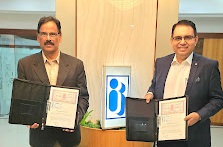New Delhi, 28 May. Defence Research and Development Organisation (DRDO) has established the near isothermal forging technology to produce all the five stages of high-pressure compressors (HPC) discs out of difficult-to-deform titanium alloy using its unique 2000 MT isothermal forge press.
The technology has been developed by
Defence Metallurgical Research Laboratory (DMRL), a premier metallurgical laboratory
of DRDO at Hyderabad. This is a crucial technology for establishing
self-reliance in aeroengine technology. With this development, India has
joined the league of limited global engine developers to have the manufacturing
capabilities of such critical aero engine components.
To meet the bulk production requirements, DMRL
technology was transferred to M/s MIDHANI through a licensing agreement for technology transfer (LAToT). Using the isothermal forge press facility available at DMRL, Hyderabad, bulk quantity (200 numbers) of HPC disc forgings pertaining to various compressor stages have been jointly (DMRL & MIDHANI) produced and successfully supplied to HAL (E), Bengaluru for fitment in to Adour Engine that powers the Jaguar/Hawk Aircrafts.
In India, the Adour engine is overhauled by HAL (E), Bengaluru under a licensed manufacturing agreement with OEM. Like in any aeroengine, the HPC Drum assembly has to be replaced after a specified number of operations or in case of damage.
The annual requirements of these high value HPC discs are quite large,
warranting indigenisation. HPC drum is a highly stressed sub-assembly and is
also subjected to low cycle fatigue and creep at elevated temperature. The raw
materials and forgings for HPC drum are required to be of the highest quality
which can meet the specified combination of static and dynamic mechanical
properties.
DMRL developed this forging technology by integrating various science and knowledge-based tools. The methodology adopted by DMRL is generic in nature and can be tuned to develop other similar aeroengine components. The compressor discs produced using this methodology met all the requirements stipulated by the airworthiness agencies for the desired application.
Accordingly, the technology was type certified and letter of technical approval
(LoTA) was accorded. Based on the exhaustive component level and performance
evaluation test results, HAL (E) and Indian Air Force cleared the components
for engine fitment. Apart from DMRL and HAL (E), various agencies such as
MIDHANI, CEMILAC and DGAQA worked in unison to establish this crucial
technology.






